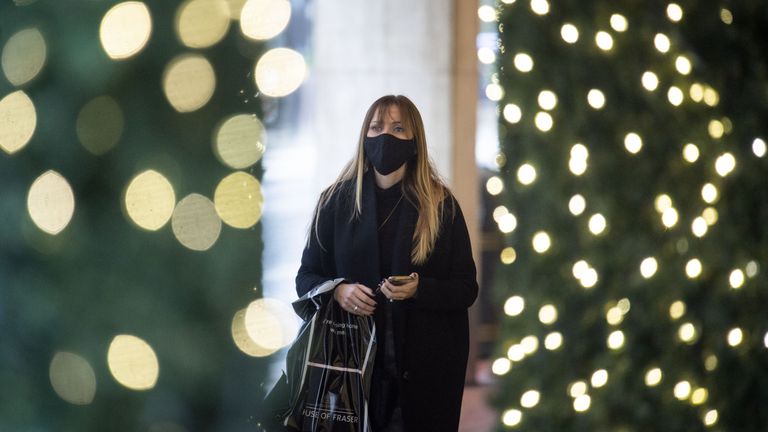The government is in danger of leaving it “too late” for a short national lockdown to be effective in driving down the rate of coronavirus infections, a member of its scientific advisory group has warned.
Professor Andrew Hayward, from UCL’s institute of epidemiology and a member of the Scientific Advisory Group for Emergencies (SAGE), told Sky News that “more intensive action” is needed across the whole country to halt the second wave of COVID-19 infections.
He said the government’s three-tiered approach for localised restrictions had “put a bit of a break” on the transmission of the disease and the virus had “slowed down” in some areas under Tier 3 measures.
But he added this is “not same as turning it around to make it decrease”.
UK deaths hit their highest level for five months on Tuesday, when 367 new fatalities linked to coronavirus and nearly 23,000 more cases were recorded.
Prof Hayward suggested a three-week lockdown, a proposal which has become known as a “circuit breaker”, was needed before Christmas.
“Last time we had lockdown which went on four months and one of the reasons for that was because we acted too late,” he told Sky News’ All Out Politics.
“And I think we’re in danger of walking into that situation again whereby we let cases increase to a level where a short lockdown is not going to be sufficiently effective.”
He added: “It’s more effective to act earlier, you save more lives the earlier you act – I think this needs to be way before Christmas and quite soon.”
Prof Hayward warned the peak of a second wave of COVID-19 infections this winter might be “less steep” – but could “last longer” and so lead to more deaths.
The Daily Telegraph reported on Wednesday that Downing Street is working on the assumption that the second wave will be more deadly than the first, on the basis of SAGE projections.
Earlier, a cabinet minister told Sky News it is “too early to say” how people will be able to celebrate Christmas this year, with many people currently banned from socialising with other households either indoors or outdoors.
Asked how people might be able to celebrate in less than two months’ time, Environment Secretary George Eustice told Sky News’ Kay Burley: “The prime minister has been very clear, as we all are, that we want people to celebrate Christmas in a way that is as close to normal as possible.
“But it is too early to be able to say exactly what the situation will be come Christmas, and exactly what different parts of the country will or will not be able to do.
“Obviously checking the spread of this virus is paramount, but alongside that we want people to live their lives as close to normal as possible, including at Christmas which is an incredibly important time for families.”
The Sun reported on Wednesday that SAGE analysis suggested the highest level of restrictions, Tier 3, may be needed across all of England by mid-December.
And SAGE member Professor Sir Mark Walport said it is “not unrealistic” to think that 25,000 people could be in hospital with coronavirus by the end of November.
Mr Eustice said the “right approach” to responding to the increase in infections was the government’s three-tiered system for localised restrictions, which he said ministers are “going to stick to” despite pressure for a national “circuit breaker” lockdown.
However, he added that the government would “keep all options open” and ministers are “concerned” by the fresh spread of the virus.
“We’ve been monitoring the incidence of this disease and it’s why a number of weeks ago we strengthened those restrictions, why we’ve been introducing new restrictions in some of those northern towns and cities where there’s been an early spike,” he said.
“We know that mortality very sadly tends to follow those spikes in incidence by a number of weeks – it’s maybe that we started to see that yesterday.”
Mr Eustice said the incidence of the disease had begun to “dip back down” and there had been a “dampening” of the spread of the virus since the reintroduction of restrictions since the summer, but he admitted ministers are facing a “very difficult situation to control completely”.
He defended the government’s loosening of national restrictions over the summer, suggesting it was an easier time to manage the disease.
“We didn’t see a spike in the summer when we eased those lockdown restrictions, partly because it was in the summer and you had long days and warmer weather not conducive to spread of the virus,” the environment secretary said.
“We started to see an uptick in the virus in September, we monitored that very closely and started to reintroduce, therefore, restrictions later that month and we’ve been refining those ever since with targeted steps.
“This is a virus that spreads in winter months and it’s a difficult situation to manage but I think we’re taking the right approach.”
Greater Manchester mayor Andy Burnham, whose region is in Tier 3 restrictions, warned that “time is running out” for a national “circuit break” lockdown.
He called on ministers not to “dig in” over their tiered system and instead be “open-minded about what is going to deliver the results, in terms of the drop in cases, and do least harm to the economy”.
“In the discussions that we had with the government, we heard the chief medical officer, the deputy chief medical officer, the chief scientific adviser all say that they don’t think the tier system and the small number of closures that have been brought about are going to actually deliver the results in terms of the drop in cases,” Mr Burnham told Sky News.
“So we were hearing from the experts that the government actually is heading out down the wrong path, and you could go from Tier 3 to Tier 4 to Tier 5 and it would seem that, they fear, that isn’t going to be enough.”


